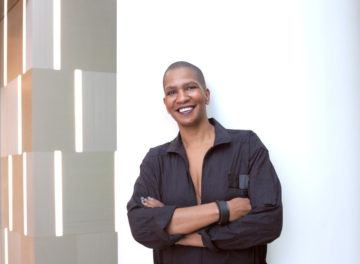Pamela Sneed in The Paris Review:
 Uncle Vernon was cool, tall, hazel-eyed, and brown-skinned. He dressed in the latest fashions and wore leather long after the sixties. Of all of my father’s three brothers, Vernon was the artist—a painter and photographer in a decidedly nonartistic family. To demonstrate his flair for the dramatic and avant-garde, his apartment was stylishly decorated. It showcased a faux brown suede, crushed velvet couch with square rectangular pieces that sectioned off like geography, accentuated by a round glass coffee table with decorative steel legs. It was pulled together by a large seventies organizer and stereo that nearly covered the length of an entire wall. As a final touch, dangling from the shelves was a small collection of antique long-legged dolls. This was my uncle and memories of his apartment were never so clear as the day I headed there with my first boyfriend, Shaun Lyle.
Uncle Vernon was cool, tall, hazel-eyed, and brown-skinned. He dressed in the latest fashions and wore leather long after the sixties. Of all of my father’s three brothers, Vernon was the artist—a painter and photographer in a decidedly nonartistic family. To demonstrate his flair for the dramatic and avant-garde, his apartment was stylishly decorated. It showcased a faux brown suede, crushed velvet couch with square rectangular pieces that sectioned off like geography, accentuated by a round glass coffee table with decorative steel legs. It was pulled together by a large seventies organizer and stereo that nearly covered the length of an entire wall. As a final touch, dangling from the shelves was a small collection of antique long-legged dolls. This was my uncle and memories of his apartment were never so clear as the day I headed there with my first boyfriend, Shaun Lyle.
It was the eighties, late spring, the year king of soul Luther Vandross debuted his blockbuster album, Never Too Much, with moving songs about love. If ever there was a moment in my life that I felt free, unsaddled by life’s burdens, and experienced, in the words of an old cliché, “winds of possibility,” it had to be the time with Shaun Lyle heading upstairs to my uncle’s house as Luther Vandross blared soulfully out from the stereo, “A house is not a home.”
Of course Shaun was not the first or last person with whom I’d experienced feelings or sensations of unbridled freedom. Like seasons, freedom came in cycles, like in fall, in college with no money, chumming around with my best friend and school buddy Michael. We spent late afternoons wandering Manhattan’s East and West Village, searching for cheap drinks and pizza at happy hour specials, ecstatic in our poverty. Michael was a blond Irish Catholic punk rocker from Boston. We met when I was an RA at the New School’s Thirty-Fourth Street dorms at the YMCA. They were narrow, tiny rooms like closets and some floors served as a hostel for homeless men. Punk music blared from Michael’s room. I would knock on the door, commanding, “Turn it down.” Eventually, we united over the fact that he put a towel under the door to block the smell of weed smoke that frequently leaked from his room into the hallway. Michael and I were both writers, astute critics, and teacher’s pets. In fiction-writing class, we formed a power block. No piece of writing done by another student escaped our scathing critique. Professors deferred to us. “Michael, Pamela, what do you think?”
More here.
